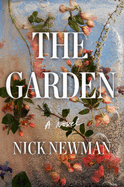
Nick Newman's The Garden is a shape-shifting novel, an enigmatic fable that twists slowly into a more sinister dystopian narrative with a surprising turn at the end. The questions it asks and the hard truths its protagonists turn away from will keep readers intrigued.
Evelyn and her younger sister, Lily, have lived in the garden all their lives, more or less. They remember little from before, although in the early years there were parties, their father holding court, their mother overseeing. Then the people went away, and the gates were locked, as were the doors to the bulk of the sprawling house. The sisters live now out of the kitchen, and the garden provides everything they need and nothing is expected to change--until it does.
The sisters haltingly identify the creature that appears in their kitchen, stealing their honey, as a boy. The boy is unknown and therefore unsafe, a curiosity and a threat. As they wrestle with this new challenge in their long-immutable garden, the sisters face new choices and turn against each other in new ways.
Newman's gifts lie in the quiet accumulation of his novel's unsettled atmosphere. The garden provides food, sustenance, and floral beauty; it is also constantly threatened by dust storms capable of burying the known world. This parable of change probes the promises and terrors of personal choice. "The vagueness of their mother's threats had made a blank space... and only now was Evelyn realizing that she and her sister saw that blankness quite differently. It excited Lily. It terrified Evelyn." The dystopia it represents may be more real than readers originally understand. --Julia Kastner, blogger at pagesofjulia

